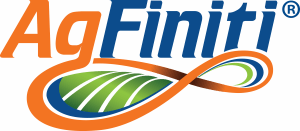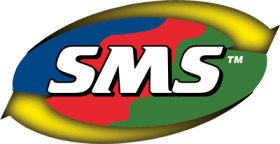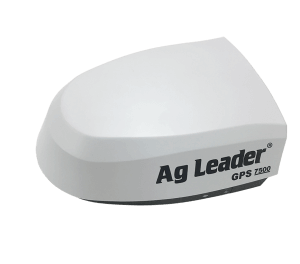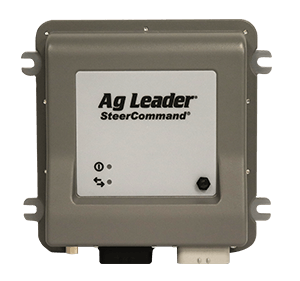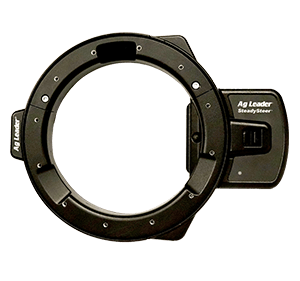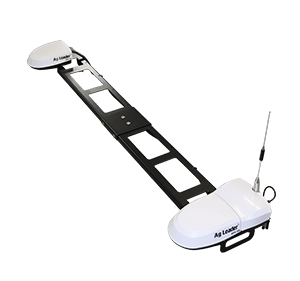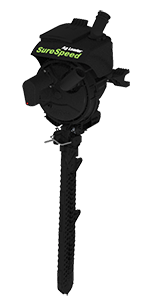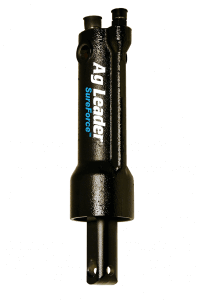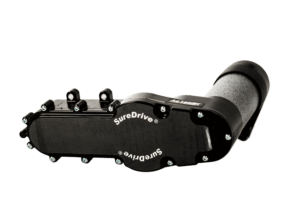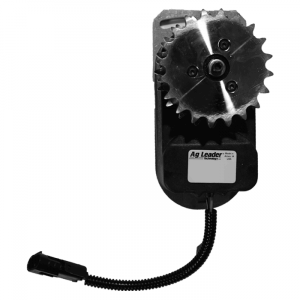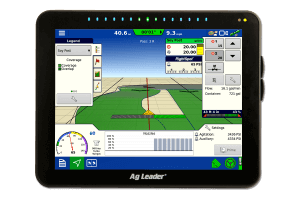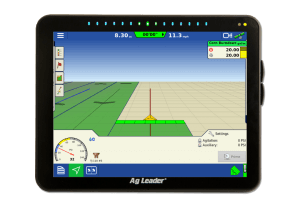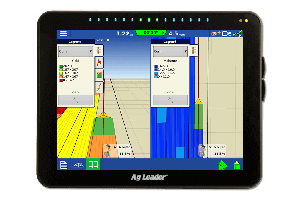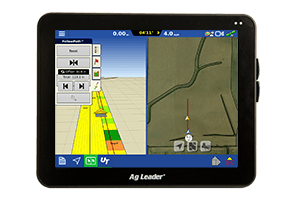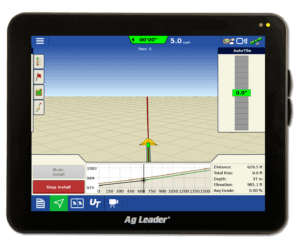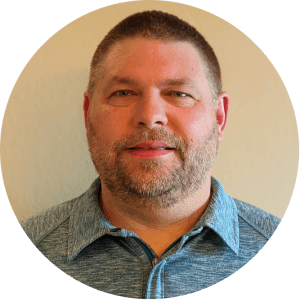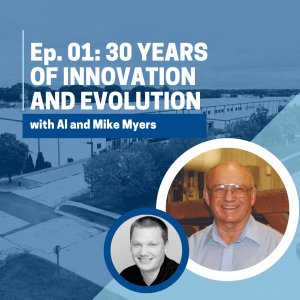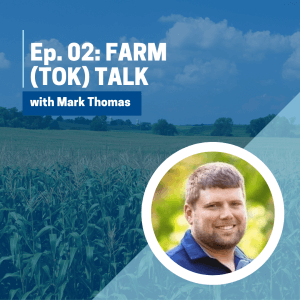Building Software Solutions - Ep. 3
Listen and learn how Ag Leader’s Director Of Software Solutions, Corey Weddle, one of the first Ag Leader employees, and his team of developers designed Ag Leader’s software from the ground up. One of the most versatile software solutions in the market.
Corey's Background
Russ Morman 0:52: Hello everybody. Today, we’re going to be talking more Ag Leader with one of Ag Leader’s first employees, although admittedly, not a heck of a long time before me. But one of the few people here that have actually been here longer than me, we’re going to be talking to the Director of Software Technology at Ag Leader, Corey Weddle. And we’re going to be discussing software solutions in Corey’s journey in basically helping create the most user-friendly technology for our customers. I know that when I’m at trade shows or conferences, I get as many people who have Ag Leader equipment and read it into SMS, as I get people who have no Ag Leader hardware and read it into SMS. So, you’ve obviously done a great job, welcome Corey.
Corey Weddle: Thanks Russ, appreciate it.
Russ Morman: Appreciate you as well, sir. Because without, without your great work, I wouldn’t have a job. So, I want to give a little background first, you are unfortunately from Illinois and give us a little background. Before you came to Ag Leader. Where are you from and how’d you get here?
Corey Weddle 1:49: Sure. Originally from Illinois, as you mentioned. Also, I was in a military family, so we moved around quite a bit. But my grandparents on my mother’s side, have a farm in Illinois, my uncle runs it now. And that’s where I put up final roots before coming to Iowa. Went to University of Illinois for my college and graduated as an Ag Engineer from there and came straight to Ag Leader from college. So, haven’t really ever worked anywhere else. And been here ever since in Iowa.
Russ Morman: I didn’t know about your military family background. Number one thing I learned today.
So, you and I have that in common. In that I came right from college. So, how did you hear about Ag Leader? I mean, how, obviously there had to have been something like, oh, there’s Ag Leader. I mean, for me it was, oh my gosh. I’m a week from graduating college and I don’t have a job.
Starting at Ag Leader
Corey Weddle 2:52: Yeah. Well, it was somewhat dumb luck. I was finishing up my senior year and looking for a job. Had several offers. The market was not good when I was graduating for hiring engineers. And so, I had a couple offers, but I was holding out because I didn’t really like any of them. They weren’t things I wanted to do and, happens that, that semester before I graduated, they had the first ever precision ag class at University of Illinois. And it was just an intro, it was actually just a half semester. And it was just new technology, a new concept at that time. And I took that and that got me interested. And so, Al, founder of Ag Leader obviously, had posted a job offering. At, at the University of Illinois, he was looking for a couple engineers and Roger Zuki, also was an alumni an Illinois alumni. He had helped post it as well. And so, I just happened to see it on the job board and called Al, came up to Iowa, had the interview, got an offer.
Russ Morman: So, rest is history.
Corey Weddle: So yeah, rest is history after that.
Russ Morman: It was funny how things don’t always work out the way we thought. Again, for myself, my last semester, I just happened to run into, Reed Hester and he got me my interview. On our first podcast I talked with Mike, and he really didn’t even plan on being at Ag Leader.
He wanted to go work and be a programmer for a supercomputer or something. And it just, things tend to work out differently. So, when you first got to Ag Leader, you beat me here by a year, we were in the building across the way here. Had they done the building expansion when you started yet or was it still half of what it was?
Corey Weddle 4:14: No, actually the week I started was the first week they had moved into the expansion, which doubled the size of the building, which wasn’t that big. Because you could see from one end of the building to the other, when they kept one door open, you could see all the way to the other end. It was that small. But yeah, I started the week after they opened the new building and so I got to be in the new part. Which was just a mirror of the other side.
Russ Morman: Yeah. It absolutely was, it was pretty simple, humble beginnings. I was remembering my desk was not a desk. It was an eight-foot table with collapsible legs. And I had one of those cheap bookshelves behind me and a telephone and a big old school computer screen. So, it’s definitely come a long way.
Corey Weddle: Yeah. I started with three cardboard tables, basically. So, I was kind of in an elite position then, because I had multiple.
Russ Morman: Yeah, that’s right. Plus, I remember when I got there at the far end and you even kind of for a while had your own little, well, it wasn’t an office, a room clear at the end and who was in that with you?
Corey Weddle: Brett Johnson.
Russ Morman: Right. Okay. I couldn’t remember for sure. But you started out as the GPS guy, didn’t you? That was your primary responsibility when you started?
Corey Weddle: Yeah. When, when I started at Ag Leader, it wasn’t to do software, at all. It was actually to work on application equipment. We were just getting started in that, just saying, hey, let’s get into variable rate control. That was at the YM 2000 we still had then but I never did a today’s worth of work on that project.
Russ Morman: Well, it kind of went away really.
Corey Weddle: Well, it stayed, but it evolved into the PF 3000 was going to be what we used to do that initially. And Roger Zuki took that project. He had a real passion for that, and he was already here. So, the GPS project was half done when I started. And so I took over that project, for our first GPS receiver project, which is the GPS 2000 and took that over and we were trying to get software, desktop software to provide a mapping solution for our customers, because we were going to have GPS and we had no software to give them.
Russ Morman: It was just Ag Leader 2000. That was it AL 2000?
Corey Weddle 6:10: Well, we had a utility called AL 2000, it was just a converter to text files basically. To convert it from generic format. But Precision Map 2000 was our first software. And that was the other project I took on when I started and that wasn’t started at all, and we partnered with another company, and we had that out three months. It was three months, start to finish to get that released and as an Ag Leader product. And we finished the GPS 2000 in the same time span they were released at, basically the same time. That was half done, at least when I started. But it still was a quick project.
Russ Morman: That came out, was it November of ’96? Am I remembering that right? It was five, six months before I started, I thought.
Corey Weddle: They both came out in the August, September time frame. Okay. There was a month stagger there. We had some technical issues, but yeah, they were both for that fall of ’96, we had units in the field.
Russ Morman 7:01: I remember, early on going and doing some trainings, with dealers with the GPS 2000, you know, in hindsight it seems how far we’ve come and how easy stuff is to use. But at the time, all the things that that little GPS system would do, you know, I remember we had it in a dealer’s pickup and he loved to show it off. We would drive around; he’d mark a spot and it would navigate him right back to where he was and he’d reach down to the mud puddle and he’d flick me with it out of water from the mud puddle. And, and he was like, this is just like the greatest thing ever. And we’ve come so far since then.
So, when I first met you were really primarily involved with GPS stuff. And then, you started off with software equipment or eventually became SMS Basic, right?
I mean, how did that project get started? I mean, considering how robust that is. That’s a major undertaking for us to write our own desktop software. How did that start?
The Start of SMS
Corey Weddle 7:52: Yeah. So, as I mentioned we started out Precision Map 2000, which we had partnered with another company. Logic was the name of that company at the time and, after we started working with them, they were shortly bought out by Case IH. And they took over and after a while of trying to partner with them and work through that, it just wasn’t working out. They wanted to build software for their displays, and we needed stuff for ours that, just wasn’t happening. And so, we just decided that, we wanted to try to build the software that we knew our customers needed and was going to best support our hardware. And that was our first target, was support Ag Leader hardware, not everyone else’s. Step one was to get that in place.
So, yeah, we convinced Al to take on, as you said, that challenge that we had never done anything like that. We didn’t have the developers in house that had done anything like that. And we built it from scratch.
Russ Morman: Yeah. There’s no doubt.
Corey Weddle: Hired a new team completely and took us a year to get the right team in place, and then it took us a year to build SMS Basic, that first version.
Russ Morman: When did SMS Basic first get released?
Corey Weddle: Oh gosh. Yeah, I should remember this like it was yesterday.
Russ Morman: It wasn’t though.
Corey Weddle: It wasn’t yesterday, that’s the problem. that was, 2000.
Russ Morman 8:57: Okay. Well, so again, you know, we went from Precision Map, which, in its day was some pretty neat stuff. But in hindsight, with what we’ve done with SMS Basic, later on SMS Advanced and now AgFiniti. It’s just so much easier to use and the platform now supports really just about everything out there.
So, you mentioned, and I actually didn’t know this, when we first started out we didn’t have that in mind to be a platform that supported multiple different colors of displays. So, was there a time where like, okay, now we’ve got this software out as successful. Let’s add support for all these other platforms. I mean, what was kind of the thought process behind that?
SMS Supports Multiple Platforms
Corey Weddle 9:40: Yeah. And again, back in those days, speaking of like where we started on the software and the mapping and how far we’ve come, Precision Map 2000, you know, one of the big things was it could make an elevation map. We were excited. People couldn’t do that with other software. We could make an elevation map and that was like exciting for people. Were they great maps? No. The quality of receivers is just night and day from there to where we are now in terms of accuracy. But just to see an elevation map was something new for customers and we could do that. But it made yield elevation and moisture maps.
Three things, basically, you could map and report on. But that was just kind of revolutionary back in those days. And that quickly started to change but when we got SMS Basic out, we quickly started getting feedback from customers. I need to be able to read this data because even in those days, we still had mixed fleets of different players that were in the market that many of them aren’t in the market anymore. But at that time there were a lot of smaller players and obviously the big players, Deere and CASE and the likes.
So, you know, we started getting more feedback. We need to be able to read this data. I’ve got a mixed fleet of machines running in the field. And so, we just started trying that, again, most of the other companies weren’t doing that type of thing. They didn’t have that. The other part of it in those days was the companies were not open. And so, Deere or other big companies, weren’t providing access as easily to their data. Again, we have really changed where we’re at today, but in those days, it was a battle to get access to their formats. So, there was a barrier there that we had to work through and so we started slowly chipping away at that at the systems we could get access to.
But, you know, and we started with shape files. People would kick stuff out of shape file and convert it out. So that was one way we could get there but then we quickly started adding whoever we could get access to, but it’s taken a while.
Russ Morman 11:26: It has, but you know, for my financial well-being, I just assumed everybody owned Ag Leader hardware. The fact of the matter is there’s still lots of mixed fleets. Guys buy used equipment; they buy new equipment and the ability for us to take all of that data from all of these different sources and have it live on one platform is great. Not only that, we can also create data for those other platforms and that’s something that just wasn’t something anybody else was doing. And to do it as, not to pat yourself on the back, I don’t want to hear it from clear over here, but your team has made it incredibly easy to use as well.
It’s incredibly powerful, but yet it’s something that most folks can just pick up and use. It’s logical, I guess for lack of a better term. And now we’ve even got to where, we’re able to read stuff from third party companies into our cloud, as well. And so, it all just works seamlessly. And that’s pretty amazing.
Russ Books Less Than Stellar Hotel Room
So let me sidetrack you here, because I’m good at that. That’s a superpower of mine. So, you and I, like I said, we’ve worked together for a long, long time, you know, I can remember stories. I was thinking about this earlier. There was a Farm Progress, I don’t remember if it was in Springfield or if it was in Decatur and you and Al had either decided to come along later or I just screwed up, which is entirely possible. And I ended up getting you guys’ rooms at a less than stellar hotel. Do you remember that?
Corey Weddle: Oh, do I? Yes.
Russ Morman: So, enlighten us a little bit on that.
Corey Weddle 12:48: That was in, Springfield, I believe where we had to stay. And it was a less than desirable location in Springfield. And I’m from Illinois, so is was Al, so we kind of know those areas. But yeah, the hotel was, there were a lot of bars on windows and the door probably had an inch gap above it that I could see people walking back and forth outside. And there was wildlife in the building as well. So, not the kind you want to be sleeping around, but yeah, that was a great one that you picked. We only stayed there one night.
Russ Morman: That’s right. I forgot.
Corey Weddle: Yeah. We moved, after that.
Russ Morman: That’s a great way to preserve your job is get the owner of the company into a hotel where there’s a barn inside.
Corey Weddle: I was shocked. You still had a job after that one.
Russ Morman: Corey, I’ll be honest. After 25 years, there’s been multiple times where I’m glad I still have a job. There’s no doubt about that.
Corey Weddle: He likes you, Russ. So that’s key. He likes you, I’m pretty sure you had a good story, that there was just no rooms at the end.
Russ Morman: Just no rooms and this is what we have to do. You know, it’s the economy, whatever it was.
Corey Weddle: I do think a manger would’ve been better though. Oh, and the remote controls were actually screwed to the table in the room.
Russ Morman: Oh, that’s quality.
Corey Weddle: Yeah. You couldn’t actually take them off the table. They were screwed, physically.
Russ Morman: That’s awesome.
Corey Weddle: So, yeah. Thanks Russ, I remember that.
Russ Morman 14:15: So, all right, opened up the door to that. That’s a story that I remember. Tell me, something, fun story like that from the early years. I’ll give you an example in the building, when I first started, we had key locks, there was no biometric anything at the time and you could jimmy the lock open with a credit card to get in.
I had to do that late at night, coming back from a trade show I’m like, oh, I don’t have my key. It’s 11 o’clock at night. Usually, Al was there until midnight every night anyway, but for whatever night, this one night he wasn’t there. And I was able to get the door open with a credit card. And so, things have definitely changed, but there’s got to be some stories like, that, that you’ve experienced in your, 26 years at Ag Leader.
Corey’s Story About the Early Days
Corey Weddle 14:52: Oh yeah. There is but that’s a hard one, Russ. Oh boy, there’s a lot of stories. There’s so many over that time period. I remember Farm Progress, you know, again, back in those days, we were much smaller than we are now. And so everyone did a little bit of everything. I worked trade shows, I used to work Farm Progress with you guys. I mean, like similar to what you said, we were there to work, not just to play around and walk the show. And I’ve done trade shows on my own back in those days because people just did everything. I did Tech Support.
But I remember in the old days of Farm Progress, when there weren’t fixed sites. You remember this? It would always rain and there would be a mud pit and we would get the van stuck. I remember several times the vans and us out pushing vans trying to get them unstuck and packing up in mud and they didn’t call them, usually, either. They didn’t call the shows back then like they do now.
Russ Morman: Yeah. Now, you know, there’s a lightning strike within a state and they have to close the show early. Yeah, that’s true. I mean, it’s funny you say that. I remember one of the first Ag Leader literature bags that we ever had there were some folks not only from the Midwest, but from outside of the Midwest and even outside of the country and there were folks that were coming in, because it was so muddy and just taking our literature bags and using them as over their boots. And it just infuriated me because it was like, come on, you know? So they would take the literature out of the literature bags and put them on their feet as boots to walk around Farm Progress show. So yeah, there were just all sorts of stuff like that. Yeah. I’d kind of forgotten about that actually.
Corey Weddle: There were a lot of interesting times that Farm Progress. I can tell you that, over the years.
Russ Morman: All the different people we’ve got to meet.
So, somebody asked me this earlier today and I couldn’t remember. Do you remember when you started say in, late ’96 on into ’97, how many people worked in the building? Was it 75? Was it 50? It wasn’t 250, but I don’t remember how many it was.
Corey Weddle: Yeah. You got me on that one.
Russ Morman: Really? That’s alright, I couldn’t remember either.
Corey Weddle 16:52: It was at least 50 at that point. And again, a lot of that was part-time production. I mean, we were ramping up production in those years, we couldn’t keep up with demand for displays and obviously we were also doing OEM business and so business was booming. And our product line was so much smaller, it was yield monitors, basically, at that point and software and GPS. We didn’t have guidance yet, really. And, you know, it was strictly displays and yield monitors. So, we were heavier on production employees then in shipping and that type of thing. Then we were engineering staff, we were still pretty small.
Russ Morman: Yeah. I was going to say this earlier and I’d kind of forgot. We were talking about the YM 2000, recording application, you know, it was kind of early on for that, and I don’t think we ever really released it, but we actually had a variable rate EPROM for that YM 2000.
Corey Weddle: We did, they still exist.
Russ Morman: Yeah. I have one in my desk, but we never actually released that. So had we done that, boy, that would’ve been something. Having variable rate prescription reading technology in the YM 2000s. Once I popped open my desk, I’m like, oh, I forgot about that. So that, you know, it’s amazing.
The Ag Leader Engineering Team Evolution
Russ Morman: So, go back to say, six months, a year into it. You’ve finally got your team set up. How big is your team now?
Corey Weddle 18:02: To be honest with you, it’s pretty small. We’ve, again, SMS years we ran with a very small crew. Which again, who we compete with don’t do that. And so that’s another thing I like about us. It’s good and bad because, you could always say, if we had more people, we’d get more done, but we have really focused, dedicated people working on the products. So, I feel like we achieve a lot.
Russ Morman: I would agree with that.
Corey Weddle: We’ve got, basically, have three teams now working on software. Whereas traditionally just had one. Two of those teams are really focused on AgFiniti now and then still one team focused on SMS.
Russ Morman: That’s funny. I actually, considering all that we do get accomplished, I didn’t know that. I would’ve been way off. I would’ve guessed twice that many.
Corey Weddle: SMS, we always get asked by other outside companies, how many teams did you have working on that? And how long did it take you to build that? And I said, well, it took us a year to build SMS Basic. And then from there we just kept growing. But, that was built by two developers, originally two and a half. We had, a part-time guy for a while, but we really had two developers working on SMS.
Russ Morman: That’s amazing.
Corey Weddle 19:02: And over its lifespan, the most it’s ever had is four. And we’ve accomplished that with a small team and the original developer is still with us. So, you know, it’s a credit to that focus and his abilities and that team’s availabilities overall. But, yeah, we’ve always done it with less. Which I take a pride in because it’s cost effective, and we’re focused and we don’t throw just hoards of teams at it and we’re efficient in what we try to do and produce and stay focused.
Struggles of Ag Leaders Software Director
Russ Morman 19:29: I don’t think that anybody that knows what all the capabilities of the software were, would’ve guessed that the team was that efficient. As the Software Director, what have been some of the bigger struggles for you to overcome? Like if you’re like, man, we finally got over this hurdle and now it’s all roses. What have been some struggles that you’ve had?
Corey Weddle: Going kind of piggyback on that. Staying small. I think as we started to want to build more products, that has become more difficult. So, every time we wanted to branch out and offer a new product, you know, Basic and then Advanced well that, you know, piggybacks off Basic, Advanced just builds on that and Advanced just adds on to it. But then we built SMS Mobile and SMS Mobile PC. Those are completely new products. They all have to work together. And so, again, that same team built that. And it starts to spread you a little thinner. And so, you can’t do as many projects you want and then AgFiniti came along. And that’s when we added a more dedicated team to focusing on that product. And so, as we continue to want to do more and then you want to build apps for an iPad, those are all our new unique products, right. And so that’s where we’ve got to be really picky about what we do and focus on the features we do add because we can’t do everything and do them well.
Russ Morman: Yeah. Again, yeah, that’s true.
Corey Weddle: We want to focus and do what we can do, do it really well. And then, build off of that versus trying to do everything at once and fail it. All of it.
Russ Morman 20:49: Yep. So, you know, you’ve actually been at Ag Leader a year longer than I have. It’s not the norm today or in my lifetime it’s not been the norm to stay at a company for that long. Somebody will say Russ, how long you’ve been at Ag Leader, and I’ll tell them and I’m like, well, I don’t want to go nowhere else, you know, but truth of the matter is, it’s kind of like a little family. It really is. You know, a lot of my friends that I have, that I consider close friends now, either have or are currently collecting an Ag Leader paycheck. And that’s important to me. It’s like the family, you didn’t know that you wanted, but you needed. What keeps you here, at Ag Leader, aside from your prison record and you can’t get hired anywhere else?
What Keeps Corey at Ag Leader?
Corey Weddle 21:31: That’s right. I can’t work in 49 other states. Thanks Russ, for outing me. I’m going to have to move now. I’m with you on that close knit family. I mean, there’s so many people that have been here for a long time and, you just, the opportunity. I feel a loyalty, obviously. Al took a chance on me originally, straight out of college and all those projects I got to take on. I had a great opportunity and I respect and have a lot of loyalty to Ag Leader and Al and the family.
Russ Morman: Sounds like a mob thing.
Corey Weddle: Yeah. The family.
Russ Morman: You all are from Illinois. I’m not judging.
Corey Weddle: We are. Yeah. That’s where it starts from. Yeah, no, I’ve had to deal with larger companies working here and, you know, the cultures are just completely different than ours. And, I’ve got to see how those dynamics work at a bigger company without having to work with for them. And, you know, we’re just not, that’s not the Ag Leader way and that’s not who we are.
And I’ve seen that evolve over that time as you have, you know, as we’ve grown and tried to figure out how to be bigger but yet still maintain this culture and it’s not always easy, but I think we’ve done a hell of a job doing it.
Russ Morman: I agree.
Corey Weddle: And all the new blood coming in as well is buying into that. And I think building off that and pushing us older guys to see new ways of doing things.
Russ Morman 22:40: And that’s absolutely true. I was presenting for some growers in Texas, a few weeks back and, Parker, our young man that lives in Mississippi, I was presenting, and I made mention about how I had been at Ag Leader for 25 years. And then when he presented, he goes, you know, Russ said he was here for 25 years. I’m not 25 years old. And so, you begin to date yourself, but on the flip side of that, I don’t know what I’m supposed to feel like at 48 years old. But I think the younger blood keeps us young.
Corey Weddle: Yeah. And at some point, you’re going to have to turn it over to them, right.
Russ Morman: Maybe.
Corey Weddle: They’re going to carry the torch, so you want to build that, and you want to grow that and not hold onto it to so tight because other people have to come up and grow and you want to make sure that the right people for our culture, and I think they’ve done a good job of that as well. And people want to be here generally that are here.
Russ Morman: I would say that’s true. Yeah. And in fact, you know, a core number of the folks that were here when I started are still all here. You know, you, Al, Roger, you know, both Rogers, I guess. Brett, all these guys, you know, they were all here, when I started and they’re still here and they’re still part of the company. I mean, again, some people come and go, some people even come back.
Corey Weddle: They come back and that’s always the telling tale when somebody comes back.
Russ Morman: That’s exactly right.
10 Years of SMS and AgFiniti
Russ Morman 24:01: So, how has your focus changed on SMS and AgFiniti say from 10 years ago to today? What did you focus on 10 years ago that you’re not focusing on now, what’s different on the focus for the software department?
Corey Weddle: The connectivity is just one of the biggest things. And that mobility of being able to run to see your maps or your data, remotely, wherever you’re at on your iPad, on your phone now. That wasn’t really feasible 10 plus years ago, you could do it, people were doing it with laptops and tablets. It was a mess wireless, you know, internet was terrible. I mean, all those things, I think that’s still not where we’d like it to be, but it’s night and day from where it was 10 years ago. And so, it just opens up so many more opportunities that we didn’t have, whereas I was land locked on a desktop or my laptop. Which would’ve been really big and expensive, you know, 10 years ago. And to carry that around and be afraid you were going to damage it. To what we can do when you pull your phone out of your pocket and now, I can pull up my data and see it. I can remote into a display. And those are just things we couldn’t do, practically. And now they’re expected and common place.
And I think that whole making sure we’re interconnected, being able to pull data from other people’s clouds from other companies’ competitive clouds. I mean, those are just things that weren’t really feasible before and we just start getting to another level of easy. And that whole connectivity piece before connectivity was manual, it was a USB, it was a sneaker drive type thing, you had to move stuff around manually. And now we just automate that and make it happen wirelessly.
Russ Morman 25:28: Tell me if I’m wrong here, this always comes up when I’m talking to growers, my age or older, we talk compatibility between different colors of paint, so to speak. And of course, inevitably, the hydraulic coupler thing comes up with the Pioneer versus Deere.
It seems to me, as it relates to software, that a lot of these companies that we normally compete with seem to be a bit friendlier when it comes to working with data and stuff. Is that because we’re able to read all these data, from different companies, because we’re able to pull stuff in from competitive clouds. Is it a bit more of a friendly, thing to work with or how is that?
Corey Weddle: Yeah. And like I mentioned earlier, it’s really different now than it was when we started, where everyone was really closed. They were closed systems, and no one wanted to give you their data because that meant they were giving customers, potentially. That is really different today because growers have spoken, and their trusted advisors have spoken that we need this data to flow better. And it’s one of the biggest pain points they bring up and it’s still a problem. We’re still not there completely, yet. It’s way better, night and day, from where we started. And some people don’t have perspective on that to say, we are night and day from where we started 20 plus years ago.
You know, 26, when I started. But today, there’s an openness. People want to, because now as a customer, we’ll see it as a barrier. I’m not going to buy your equipment, if you can’t read my data, I’ve been collecting for 10 years or I’m going to keep this machine on the farm and that’s what I spray with and it has this in it and that’s what you’re going to read, or I’m not going to go with you. And so that causes our competitors to be very willing, to be open now because they don’t want to lose a hardware sale, equipment sale. because they’re not willing to lose that deal because of that because that’s or they make their money. And so, the market has really forced that, in my opinion. Forced those other companies to have an open stance as much as they can.
Russ Morman 27:18: I think that’s absolutely true. As with most things, competition in the market, breeds innovation and things like this. I mean, it works in everything, I guess.
So going forward, you know, we’ve talked about how AgFiniti has been, with all the technology that’s out there now, the stuff we’re doing on our cloud has become a lot more feasible than just being a pipe dream. I mean, like I said, remote support, getting data where you don’t have to carry on thumb drives, like you said. Where do you expect your focus to be 10 years from now?
Data Connection for the Next 10 Years
Corey Weddle 27:45: Yeah, that’s a good one. I will definitely continue on this connectivity path and just continue to make that easier, more connections to third party systems is just, again, that’ll just keep evolving and get easier and simpler. With DisplayCast in our products displays now, that’s between our displays. I envision that type of display cast functionality between competitive systems that’s at its infancy right now. But I see that being in five to 10 years that we’ll be doing display cast type functionality between different colors of machines. That aren’t all running Ag Leader and so we can have a mixed fleet that talks to each other. In the field, not only outside of the field and so that’s a big thing.
Obviously, autonomy on everyone’s breath and where that’s going. And to me, that’s part of it. That’s part of that connectivity. Like, these machines have to talk if they’re going to be autonomous or have some autonomous functionality guidance line sharing between machines. I mean, we convert that all manually in SMS and we can take it from XYZ to XYZ over here and, you know, run your same guidance lines, but it’s a manual process and it’s outside of the field. So, you know, those are types of things I can envision that they’re just going to continue to try to automate and make it more seamless. And people are just going to start to expect that.
They already want their guidance line. I ran it with this machine and now I’m going to run to this machine, and I need those guidance lines to work. Well, okay, it’s still a manual process for them and they want that automated. They don’t want to have to think about it. They just want to get the machine and go.
Russ Morman: Because if they’ve got two Ag Leader Displays that’s already doing it, why can’t I move it over to this brand X display that I’ve got.
Corey Weddle: Right. I need it, because it does something specific and I really like that. And again, like I said, it’s a barrier. They’re not going to change that until it dies. Maybe, you know?
Russ Morman 29:26: Yeah. I think there was a Dilbert cartoon, something about building in obsolescence into the displays and they’re like, no, I don’t want to do that. And I understand that. When somebody has something that does what they want it to do, regardless of what somebody else might think that it does that function. Even if it’s not brand new.
Corey Weddle: Yeah, I was going to add to the other thing that I see that’s, we’ve been focusing more on is just the agronomic side of things. In terms of helping people make those better decisions. Versus having to do a lot of data crunching ourselves or figure out their own solutions. I always think the farmer and their trust provider are the ones that need to make the final decision. Making the decision for them and just saying do this because we think it’s right, is not something I believe in. But you need to get them to the point where here’s the results, boiled down into something they can consume and make decisions on, versus them having to spend a lot of time crunching.
And we’ve been in that phase for a long time. Here’s the tools you can do whatever you want. You can build it, you can craft it however you want, but you got to put the time and effort into it. And the reality is a lot of people don’t have that time or they need to work with it is just too time consuming either for the trusted advisor or the grower. So, you know, we’ve been working, slowly, on better tools that help condense that process or automate parts of it. And I think that’s just going to continue to go. And there’s a lot of competitors out in the cloud that are doing that type of thing, but there’s always this what’s the real value in it? Is it real what it’s telling me? And so, we really focus on not trying to put something out there that we don’t believe in or say we can stand behind.
And so, we’re not slow to come to the market because we could do things, but they probably are not the right things and they’ll probably be misleading. And so, we’re really strategic about what we try to make that’s actually useful to the growers and their trusted advisors versus here’s the latest greatest. I don’t want to say it, but it’s snake oil type thing and here it is. And, I said it, and you know, here it is, that’s what everybody wants today. But it hasn’t been validated, to people believe in it doesn’t make sense. Because the minute a grower questions something, they’re not going to trust it. And so, it’s got to be something they can buy into and believe.
Russ Morman 31:26: You know, you say that, and it reminded me of something I’ve heard people say before, that buying into technology makes you more efficient, right then. So whatever piece of equipment that you buy, that makes you more efficient, it maybe it makes you more profitable. But what the software stuff does, what the analyzing of data does, is it allows you to make management changes. You know, it’s maybe not as easy as adding a steering system, and that’s coming from a company that we build steering systems. The desktop software, the analytics and stuff behind it, allow you to make farm-wide decisions that increase your profitability a lot more than a lot of other widgets out there.
Corey Weddle: Yeah. And like you said, it’s not as tangible. Obviously, I can put a steering system on, it steers, I plant straight. It takes a ton of fatigue off me as an operator. It’s instant, basically. You’ve run it for a couple passes and you’re hooked on guidance, right. Auto steering, especially. That’s tangible, people can grab ahold of that. Data is not and sometimes the data tells you something you don’t want to believe. And so again, its contract, can’t see it and it doesn’t make sense. And it’s not what I thought a lot of times. So, people have to really dig into that and it’s a harder battle versus that’s steered straight and that row is straight as I’ve ever planted. Okay, I believe that. That’s tangible and the software side of it is not always tangible. And people have been burned, like I said, they’ve been sold, here’s a solution software wise, here’s the results and then they’re like that didn’t pay me back. I didn’t get anything tangible out of that and so they get a little gun shy. And that’s the danger of you know, data doesn’t lie, but liars use data type thing. And so, it can be dangerous there in terms of what you can do to the customer’s feeling about that technology. But steering is not, unless it drives, you know, in circles and googles all over the place. Yeah. But you know, again, it’s tangible, it either works or doesn’t.
Russ Morman: That’s true. And that was always the deal with data is there’s a lot more possibility with data, but it’s also, honestly, a little bit more work to doing it. Which is why our tools like AgFiniti and all the things we’re doing to make things easier. If the data is easier to work with, people will do it. If it’s not, they’re just not going to do it. And that leaves on the table, a lot of things.
When you install AgFiniti and you scroll through that user agreement that nobody reads and you click okay at the bottom, something that makes us unique, or at least one of the unique things in the industry, is that we don’t aggregate or sell data. I don’t think enough is brought of data privacy.
Ag Leader Passes On Selling Farming Data
Russ Morman 33:55: So, expand, why did we decide to go that way versus I’m assuming that we could have made money selling people’s data to other people, but we didn’t do that.
Corey Weddle: No, and yeah, you’re definitely right. That’s how other people’s business models work and they’re selling to some other third-party that finds some value in knowing who that customer is and what they’re farming and what they planted. We had just made a decision, in the very beginning, that it would never be part of our policy unless we got to some position where the customer could benefit and was in a hundred percent control of that. And, you know, we just haven’t been pushed into that direction ever yet. But we just feel that the grower or trusted advisor, they own the data they’re working with. It’s their data and they should decide what gets done with it. And so, we are the stewards of that data and managing it in the cloud. And they’re in control of who gets to see it, who they share it to, who they want to give it to, that might get value out of it. That’s not our decision.
And so, we don’t use that other than if there’s a bug in the system and we’ve got to process something to look at it. We don’t use that though for any other purposes, other than those internal needs. And we’re not using it like an input supplier, that’s using data to then figure out what products they could increase price on. We don’t use it in any way to, other than, you know, improving the product itself.
Russ Morman 35:16: And that makes us, I know fairly unique because the grower has complete control of who their trusted advisors are, as far as, who can see the data, has access to the data, who they send the data to. It’s completely controlled by the guy that owns the data. I mean, there’s value in that data.
Corey Weddle: Yeah. No, it’s a hundred percent valuable and customers always ask like, what’s the value? Why am I collecting this? It has a lot of value. It’s up for you to decide how you distribute that. If somebody’s going to find value in your data. And you should get paid for it. I mean, I believe in that fully, if someone’s going to leverage that data, you need to get something out of it. Whether it’s a discount on something or money back or whatever. You know, you need to be able to figure out ways to monetize that. Because it has value. Somebody values it because there’s no other way to collect it. And once you didn’t collect it, there’s no way to get it back.
Russ Morman: That’s right.
Life Outside of Ag Leader for Corey
Russ Morman 36:02: So, end of the day, Corey shuts his lamp off in his office, stands up and walks out. What kind of things fuel your life outside of Ag Leader?
Corey Weddle: Oh boy, that’s a tough one. well, it’s an easy one actually. It’s my wife and my kids. So that’s I think what drives me more than anything these days. And seeing my kids grow up, my girls, and just where they’re going to be in the future, when you say 10 years out, I’m thinking, where are my girls going to be in 10 years? And they’ll be on their own, hopefully.
Russ Morman: And you’re 18, bye-bye.
Corey Weddle: I’m excited from a personal standpoint, that’s a big driver for me. From the work standpoint, when you talk about five, 10 years out, I’m really excited to see where things are going to go with the market in terms of autonomy and connectivity and just how seamless everything’s going to be. There’s just a lot of opportunity there that I’m excited to see where things go as wireless becomes more common. It’s just, everyone has wireless, and speeds are getting ridiculously high and they need to be that way everywhere, not just in major cities, but you know, it’s going to get there.
Russ Morman: Yeah.
Corey Weddle: And I think it just opens up so many more opportunities for people to value that data, because it’s more tangible. Especially when it’s not just locked in your desktop, you know, and you’ve got to go into your office and look at it versus be able to pull it up wherever you’re at.
What Makes Corey Excited to Go to Work
Russ Morman 37:15: So, we talked about this earlier, as I’m kind of looking at my notes. You know, we talked about all the things that we like about working at Ag Leader, you know, it’s the fact that’s it’s kind of like a family, you kind of get to choose, so to speak, you know, all the things that we get to do and develop and see things grow.
Anything else that gets you excited about going to work in the morning?
Corey Weddle: I think it’s just the opportunity to create something. I always like to do things that people say can’t be done. And that was a little bit like SMS. We had people that were telling us we couldn’t do it and that just drives me crazy. And we did it and then we did it better than they were doing it. Because we had competitors say, oh, you can’t do that, you can’t build what you’re trying to build. We built it and it worked. And then they were like, how’d you do that?
Russ Morman: And so, it’s whatever the next challenge is that somebody says you can’t do.
Corey Weddle 38:00: And it’s whatever in the market’s making something more difficult than it should be. And I mean, Ag Leader’s good about that. You know, in terms of, we identify somebody maybe doing it, but they’re doing it poorly. And we have a real knack for coming in and doing it better and improving on it and expanding it. When we come to market with a product, even though it’s been in the market for a while, we come with something that I feel is always better. It’s always more user friendly than user competitors. It’s more reliable, its quality, even though it might be out there, it’s better when we do when Ag Leader does it, it’s always better.
We don’t half-ass, anything. I always look at that challenge and like what are people saying can’t be done. We can do it; we can figure it out and we can do it. And it’s going to meet people’s needs. Not just that we can do it. It’s going to be valuable when we do it.
Russ Morman: It’s funny. When I talked with Al, it was a similar thing, and he was excited about building that next thing. So, I think that’s part of the culture here is building that next thing to make our customers lives better. and I do believe that’s actually part of the culture.
So, I was kind of, again, looking at my notes and learned something about you, something unique. I did not know that you were in Central America, in Panama.
Middle School Through Junior High in Panama
Corey Weddle 39:11: I was, that was part of the military family.
Russ Morman: Oh, now that makes sense. Okay. So what years were you there?
Corey Weddle: Let’s see, seventh, eighth and ninth grade. So yeah. Middle school to junior high.
Russ Morman: That’s pretty cool. What was, what’s a fond memory from there that you remember?
Corey Weddle: Oh boy. Well, we lived on the edge of the jungle and so every day you woke up, you didn’t know what you were going see and I had two boa constrictors. I caught from the jungle. One fell out of a tree on me actually. That’s not a joke. We were in the jungle and grabbed a branch and a snake fell out of the tree and I was like, oh, well, let’s take it home. And, it wasn’t poisonous, obviously. So, which was always a risk factor. But yeah, it was really interesting, just like basically a zoo outside of your house all the time, when we were there.
Russ Morman: That is all really cool, but one advantage of being a Midwesterner is winter kills all those highly poisonous things.
Corey Weddle 40:02: They hibernate. Yeah. In the jungle they never hibernate. No, they’re always there. You got to always be on alert.
So yeah, no, it was a really interesting time and it’s always funny. I look back on it and at that age, I didn’t appreciate it then, but I sure as hell, appreciate that experience now. You look down, you’re like, God, I wish I could have that back. Or, you know, that was incredible. You know, what would happen. And then you were like, oh, I’m living next to the jungle in another country, and I don’t have cable or you know, the things that are at that age, you’re like, take that for granted what what’s happening around you is something you’re not going to get back.
Russ Morman: Yeah, that’s true. Man, I couldn’t imagine that.
So to kind of bring everything full circle, another thing that the software department does very well is you kind of get to try it, before you buy it with desktop software. And explain to everybody who might not know, how do we make it easy for folks to try out your department’s equipment?
Ag Leader’s Free Trials on Software Data Solutions
Corey Weddle 41:00: Yeah, so we’ve always had a policy that we have offered trials or offered some level of free functionality. And so, with SMS, for example, we’ve always had a trial that was available. It’s 21 days right now, whether it’s Basic or Advanced, you can try them both and have 21 days on each, but once the trial’s over, they still function at a certain level and it’s basically to get your data in and out. And so we give that functionality for free, but to get the more advanced functionality, the mapping and editing and creating boundaries and prescriptions, guidance lines, that’s when you have to pay for the software. But for the 21 days, you can use all that.
You can try it all out and do anything you need to do to get a feel for it. And we got a ton of videos online, which is great people love the videos. I remember back in the day when we didn’t have that type of distribution on YouTube, and everything was written, and it was just harder to learn and you can watch a video and you know how to run something. And you can watch it again and again, and then finally, it clicks. That’s a great resource. Again, that’s free, that’s freely available, before you even buy it.
And on the AgFiniti side, we also have, again, free functionality for file transfer now with our displays. And then we have a 30-day trial, which allows you to try all the features of the software. So, there’s a lot of opportunities to try something before you buy it. But even if you don’t buy it, there’s still, you know, we always have some base level of functionality that adds value to our customers. And really that’s focused around our customers for that free functionality. But it’s still there without having to pay us.
Russ Morman: Yeah. So as a salesman, I don’t like that.
Corey Weddle: I know you don’t. I’m a realist. It’s not for everyone in some cases, but they need something and as long as we can help them, I think that’s a value.
Russ Morman: And it’s nice because, you know, the software is an investment and if they’re not necessarily familiar with Ag Leader, I can go, hey, just try it out. You have 21 days, give it a shot. When you’ve got a little bit of time, read your data in from brand X or Ag Leader or whatever the case might be, and you can see how this all works.
Full Training Courses for Ag Leader’s Data Solution Software
Corey Weddle 42:52: And we offer training. In person or remote, training is incredible. And our training team does an incredible job, and they make the videos that you can see on YouTube and they train you as well. And I think that’s a huge value.
Russ Morman: I think that is another thing that, I don’t know, is totally unique to us, but we have an entire building called the Ag Leader Academy. And we have a dedicated, software classroom, we have all sorts of training that we bring dealers in to train them so that they’re better able to support customers when it comes to application or any of the stuff that we offer. It’s a really neat, facility. And, for those who don’t know, that’s where I store all my trade show junk as well.
Yeah, definitely want to give a shout out to the training department of making videos and that sort of thing. If you’re worried about, okay, how do I do this comparison in SMS advanced, as they say, we’ve got a video for that.
Corey Weddle: And then we have the training. And it’s for customers, not just for dealers. Dealers can get trained the same way, but customers take that training. So, I mean, we just have a lot of avenues to help people out. Because again, software’s not easy for everyone. No matter how easy you try to make it. It’s just not everyone’s cup of tea. And so those courses can make a huge amount of difference for certain people. And usually when they go to a class, then it really clicks after that if they were struggling before.
Russ Morman: I think there’s even value in, if there’s 10 other people in the class, somebody has done something with the software that you haven’t thought about and they bring a question up on it.
Corey Weddle: Oh yeah.
Russ Morman: You know, I’ve, made time to attend several trainings and there’s always somebody that goes, hey, I was doing this and then somebody goes, oh my gosh, I didn’t think about that. Because the software just, it does a million things. And so, you can’t think of them all.
Corey Weddle: Right. Yeah. No, those classes are great. Because people do build off each other and somebody asks a question, they’re trying to do something with their dad. And then that makes someone else also think, I’m not doing that. Maybe I should be doing that. And it really pulls them through.
And you’re right. It’s just like Excel or Word. How many features do you use in Excel or Word? You know, we all use like 10 or 15%, I think they say roughly. SMS is a similar thing like, you can’t find it all. And some of it may not matter to you, but there’s a lot of hidden gems on there.
Russ Morman: That’s right. You know, I really am a big fan of the software and every time I go to refresher training, I pick up something different and it’s amazing like that.
So, we’ve had a pretty good conversation here today. Is there anything we haven’t talked about?
You know, I mean, we’ve talked about how you got started, what you do when you shut the office lights off, we’ve talked about how we try to make it easy to get folks into the software by offering trials, kind of where you think we’re going go in the future. Is there anything that I haven’t asked you about?
Corey Weddle: You’ve been pretty easy on me. I think actually, because I know you got some, I can tell.
Russ Morman: I need this job for a few more years.
Corey Weddle: Oh yeah, I don’t know what we didn’t cover.
Russ Morman: Well, I guess we’ll have to do Part B at some point.
Corey Weddle: Yeah, we can always do Part B.
Russ Morman: That’s right. That’s right. Well, I’m going to just say thanks to you as we kind of wind down the episode. So, Corey, I appreciate you joining us and you know, Ag Leader’s wrapping up 30 years, you’ve been a big part of the evolution. And again, one of the few people that have been here longer than I have.
So, Corey, thanks for stopping by and talking with me today.
Corey Weddle: I appreciate it, Russ. It’s a good time. Thanks.


